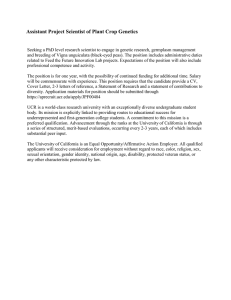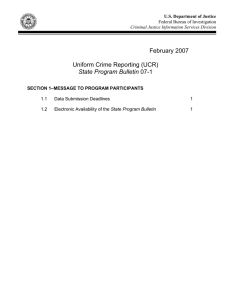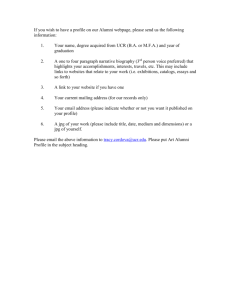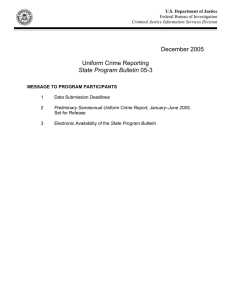July 2005 Uniform Crime Reporting (UCR) State Program Bulletin
advertisement
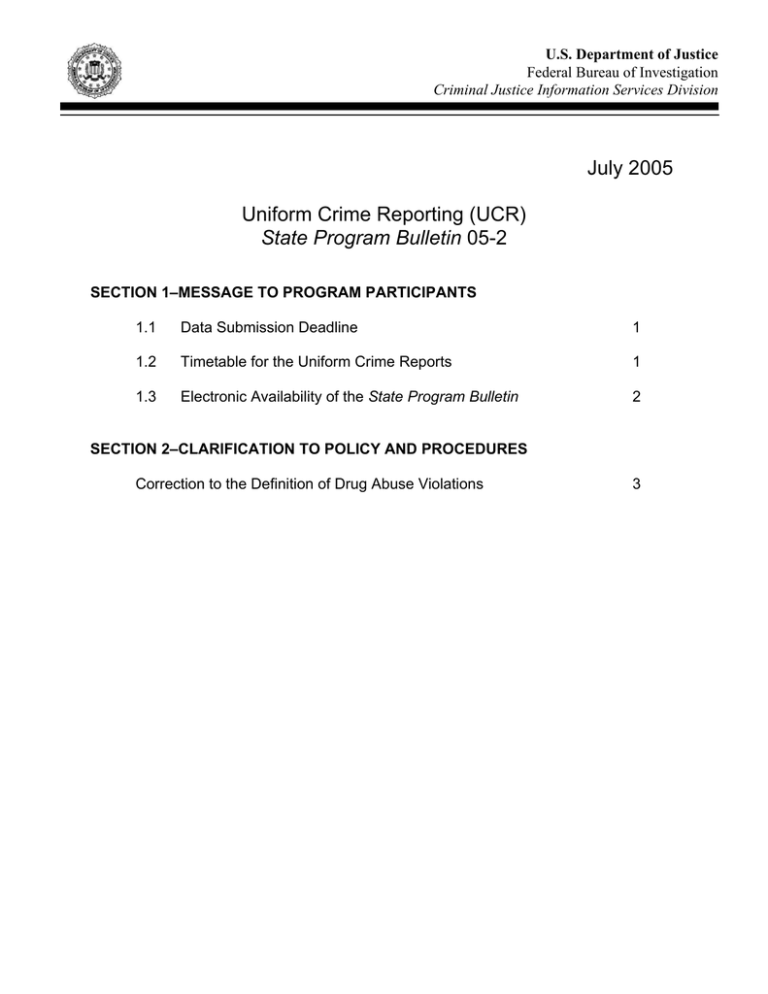
U.S. Department of Justice Federal Bureau of Investigation Criminal Justice Information Services Division July 2005 Uniform Crime Reporting (UCR) State Program Bulletin 05-2 SECTION 1–MESSAGE TO PROGRAM PARTICIPANTS 1.1 Data Submission Deadline 1 1.2 Timetable for the Uniform Crime Reports 1 1.3 Electronic Availability of the State Program Bulletin 2 SECTION 2–CLARIFICATION TO POLICY AND PROCEDURES Correction to the Definition of Drug Abuse Violations 3 SECTION 1–MESSAGE TO PROGRAM PARTICIPANTS 1.1 Data Submission Deadline State UCR Program managers should note that August 26, 2005, is the deadline to submit data for inclusion in the Preliminary Semiannual Uniform Crime Report, January–June 2005 (Semiannual Report). 1.2 Timetable for the Uniform Crime Reports As part of the FBI’s effort to keep state UCR Programs informed about data submission deadlines and UCR processes, we are including the following schedule. In order for the FBI to publish the Uniform Crime Reports on time with complete and accurate statistics, all states must adhere to the scheduled deadlines. Many agencies are conscientious about meeting these deadlines; however, agencies that are late with their submissions may cause delays with the publications. The FBI realizes that there may be extenuating circumstances that could cause an agency to miss a deadline. Nevertheless, the FBI requests that state Program managers encourage the agencies within their state to make every effort to adhere to these deadlines. State UCR Program managers who need assistance should contact the Crime Statistics Management Unit (CSMU) at (304) 625-4830 and ask to speak with their state’s statistical assistant. Month Work Process September The CSMU disseminates letters to state UCR Program managers: • • • Identifying by contributor any January–June data that the FBI has not received by the submission deadline for the Semiannual Report. Seeking follow-up from those who did not respond to trend letters for the Most-in-Population (MIP) agencies. (The CSMU may contact these managers via telephone.) Requesting verification of any January–June crime totals that show significant increases or decreases from the previous year’s data and/or verification of any high or low monthly offense counts during the 6-month period from contributors other than the MIP agencies that submitted data for 3 or more months. UCR State Program Bulletin 05-2 1 July 2005 Month Work Process October The FBI publishes and distributes Crime in the United States, 2004. The CSMU disseminates letters to state UCR Program managers: • • November 1.3 Requesting complete information on police employee counts as of October 31, 2005. The deadline for submitting these data to the CSMU is December 23, 2005. Requesting verification of any January–June crime totals that show significant increases or decreases from the previous year’s data and/or verification of any high or low monthly offense counts during the 6-month period from contributors other than the MIP agencies that submitted data for 3 or more months. The FBI publishes and distributes Law Enforcement Officers Killed and Assaulted, 2004, and Hate Crime Statistics, 2004. Electronic Availability of the State Program Bulletin The UCR Program’s State Program Bulletin is available electronically in Corel WordPerfect and Microsoft Word formats. State Program managers who wish to receive the State Program Bulletin via e-mail instead of receiving hard copies through the U.S. Postal Service should provide the Communications Unit (CU) at the FBI’s CJIS Division with their e-mail address at <cjis_comm@leo.gov> and indicate State Program Bulletin in the subject line of the e-mail. Please note that whether the State Program Bulletin is received electronically or in hard copy, it is the responsibility of the state UCR Program manager to disseminate the information as appropriate to their staff and local agencies. In order to serve our customers in the best manner possible, the national UCR Program would like to remind state Program managers to keep the CU informed of any changes in their e-mail addresses. The current State Program Bulletin, as well as previous editions, is also available via the Law Enforcement OnLine (LEO) Intranet at <www.leo.gov/special_topics/stats/stats_home.html> (under Crime in the U.S.: Uniform Crime Reports Section). Users with questions concerning access to the LEO should contact the LEO Program Office at (202) 324-8833 (telephone) or Mrs. Stacey C. Davis of the Advisory Groups Management Unit at (304) 625-2618 (telephone). UCR State Program Bulletin 05-2 2 July 2005 SECTION 2–CLARIFICATION TO POLICY AND PROCEDURES Correction to the Definition of Drug Abuse Violations After receiving questions from agencies regarding the proper Part II offense that would include reports of arrests for the possession of drug paraphernalia in the Summary system, the staff of the national UCR Program discovered an error in the definition of drug abuse violations in the UCR Handbook (2004). According to page 143 of the UCR Handbook (2004), the definition of drug abuse violations includes the equipment or devices used in the preparation and/or use of drugs. However, this is incorrect. In the following paragraph from page 143 of the UCR Handbook (2004), deletions are indicated by strikeout. 18. Drug Abuse Violations The violation of laws prohibiting the production, distribution, and/or use of certain controlled substances and the equipment or devices utilized in their preparation and/or use. The unlawful cultivation, manufacture, distribution, sale, purchase, use, possession, transportation, or importation of any controlled drug or narcotic substance. Arrests for violations of state and local laws, specifically those relating to the unlawful possession, sale, use, growing, manufacturing, and making of narcotic drugs. Note: When an agency arrests an individual who is in possession of drug paraphernalia, the agency should report the arrest as All Other Offenses, (line 26) of the appropriate Age, Sex, and Race (ASR) Form, not as a Drug Abuse Violation (line 18). These guidelines apply only when drug paraphernalia is the sole offense for which an arrest is made. In those cases where an individual is arrested for numerous Part II offenses, the agency that reports the arrest should determine which is the most serious offense and score only that one arrest (UCR Handbook, 2004, p. 97). UCR State Program Bulletin 05-2 3 July 2005
